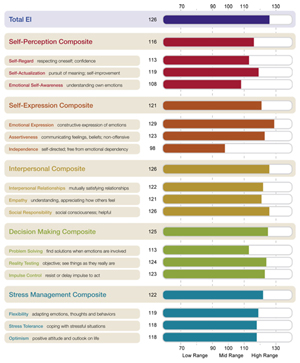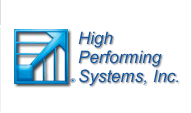|
|
Emotional Intelligence is a person's innate ability to perceive and manage his/her own emotions in a manner that results in successful interactions with the environment and, if others are present, to also perceive and manage their emotions in a manner that results in successful interpersonal interactions. In other words, Emotional Intelligence is about recognizing and managing one's own emotions and the emotions of others.
|
|
The EQ-i 2.0 is one of the most scientifically-validated Emotional Intelligence instruments on the market today. This instrument measures the interaction between a person and his or her environment, then presents results in both numerical and graphical form. The power of this instrument is in how the five Composite Scales and fifteen Subscales (see below) allow an EI feedback specialist to predict with amazing accuracy what behaviors a person is most likely to exhibit and to pinpoint the motivations behind the behavior. |
|
| As a result, a person receives specific, measurable results that allow him or her to identify and leverage strengths and to put containment on any out-of-balance areas that could interfere with his/her ability to fully access strengths. |
- Identifies strengths
- Indentifies challenge areas
- Results presented in easy-to-read bar graphs
- Focused on personal development
- Promotes greater organizational effectiveness
- Excellent selection tool
- Excellent succession planning tool
- Great for developing leaders
- Business-Centric Report
|
- Leadership development
- Individual development
- Organizational Development
- High potential identification
- Team effectiveness
- Succession planning initiatives
- Executive and general coaching
- Performance management
- Student development (higher education)
|
The EQ-i 2.0 model, shown below, is a non-linear model that shows how five Composite Scales and fifteen Subscales interact to predict behaviors. The circular nature of the model is a visual representation of how each area of Emotional Intelligence influences the next.
.jpg)
Self-Perception
- Self-Regard
- Self-Actualization
- Emotional Self-Awareness
Self-Expression
- Emotional Expression
- Assertiveness
- Independence
Interpersonal
- Interpersonal Relationships
- Empathy
- Social Responsibility
Decision Making
- Problem Solving
- Reality Testing
- Impulse Control
Stress Management
- Flexibility
- Stress Tolerance
- Optimism
- Workplace Report
- EQ 360 Report
- Leadership Report
- Group Report
- Higher Education Report
The EQ-i 2.0 Workplace Report is customizable with your company or client logo and includes many helpful resources for the feedback provider, including:
- Follow-up questions for each Subscale
- Debrief Guide for conducting a feedback session
- Action Plan template
- Development Commitment
- Balancing EI section
|

Certification
Quick Facts
Age Range:
16 and older
Administration Time:
20-30 minutes
Number of Items
133
Format(s)
Online EQ-i 2.0 Portal for quick and easy administration, scoring and more
Report Options
Workplace
EQ 360
Leadership
Group
Higher Education
Norms (link)
General Population, n = 4000
Age and gender specific
Reliability and Validity (click here)
Qualification Level:
B (North America Only)
EQ-i certified
|
Sample Report (click here)
High Performing Systems offers both online and in-house certification. These interactive, research-based classes prepare participants to give feedback on both the EQ-i 2.0 and the EQ 360. Participants begin by watching webinars and reading material before class. The class itself, only two days, focuses on leading participants to develop a deep understanding of the material by working on case studies and practicing feedback sessions with other participants. (click here).
The Science Behind the EQ-2.0 (click here)
For more information about Emotional Intelligence, click on a topic below:






 |
